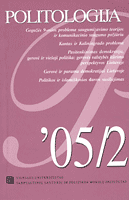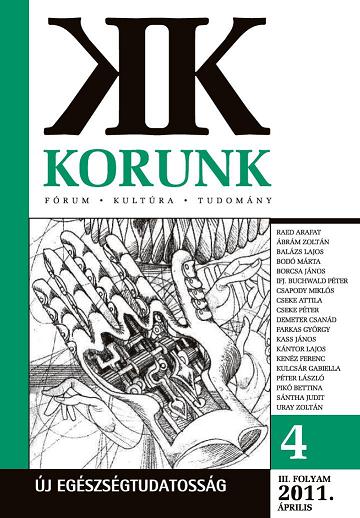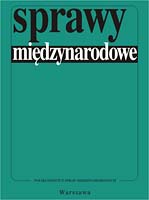
We kindly inform you that, as long as the subject affiliation of our 300.000+ articles is in progress, you might get unsufficient or no results on your third level or second level search. In this case, please broaden your search criteria.


In this article the author demonstrates in what way the "system of simuliacrs" (J.Baudrillard), "the society of the spectacle" (G.Debord), and "the theatrocracy" (G.Balandier) earmark the processes of democratic fragmentation. This is the situation when the society, having undergone a successful implementation of the state of civil relations, evolves into a somewhat new level. On this level we witness the processes of self-organization and government taking hold - namely, that of a "dispersed crowd". Generation of self-understanding and the meanings through the form of communication (the aesthetic, emotional aspects) can be denoted as one of the freshest characteristics. The machinery of the theatre, decorations, the ideology of performance has established itself in the conscience of the TV personnel. It has become the single and unique, synthetic substance of the world outlook of the society. Here we see everything being substituted for everything and everybody finding what he or she needs. TV communication implements the ideal political functionality. In the TV-shows politics transforms itself from being serious and self-responsible action, which bears in itself the ideological, social and other elements of the state, into a decoration of the government that conceals the existing and potential freedom of action of the authorities. What it finds instead is the claim to be called the real authority and politics. However, we do not observe the systemic and strategically oriented move necessary for the further evolution of state. In this case the repercussions for the media itself turn out to be unanticipated and problematic. This makes the media look for the means of its own to subjugate the attention the society pays to its interests. Under such circumstances the modality of the show, the performance becomes dominating. The way of informing takes over the characteristics, such as the attractiveness, sensual simulation of the reality, elements of the carnival, cartooning and decoration, and improvisation. As regards the information being provided to the audience, the messages the media and the politicians find impossible to be conferred to the spectators as a serious argument are well delivered by means of a well-assimilated show. This means that the contemporary system of mass communication seizes the opportunity to fulfil each and every will and need of the consumer. At the same time, however, this system takes over the initiative to tell the consumer what these wills and needs are. The article sees itself divided into the following parts: (1) Political Mediatization; (2) The Mirage of the Live Coverage; (3) The Political Show; (4) The "Stars" System.
More...

A review of the textbook by R. Lopata, Lithuanian political scientist “History of International Relations”
More...
In this interview Attila Cseke speaks about the problems of the healthcare system in Romania, the hospitals’ decentralization and his plans for the future as a lawyer and politician.
More...
This article is about the life and activity of Hungarian politician Vilmos Vázsonyi, and contains excerpts from his speech in Cluj-Napoca/Kolozsvár in 1927. Vázsonyi was elected for a parliamentarian of Terézváros (Budapest) in 1901. Vázsonyi’s political career was not usual: he connected the Hungarian national and the Hungarian Jewish minority’s welfare. In his thinking liberalism, different religions and origins were not against each other, these rather were supporting each other in spiritual and emotional formations.
More...
Raed Arafat wanted to be an emergency doctor since his childhood. He studied in Romania, and became intensive care doctor. In 1990 he created the first SMURD ("Serviciul Mobil de Urgenţǎ, Reanimare şi Descarcerare", that means Mobile Emergency Service for Resuscitation and Extrication) in Târgu Mureş/Marosvásárhely. SMURD is a mobile emergency service which collaborates with the firefighter service, and now it is represented in the whole country. In this interview he speaks about the relationship between politics and healthcare, and about the difficulties of the SMURD’s beginnings.
More...
Nilgün Gülcan (Uluslararası Ceza Mahkemesi ve Uluslararası Ceza Usul Hukuku) – 167 Yeşim Şahiner (Avrupa Birliği Hukuku – Genişletilmiş İkinci Baskı) – 169 Selin Akyüz (Tarihin Sonundan Barışın Sonuna: Terörizmi Anlamak ve Anlamlandırmak) – 171 Serkan Yardımcı (Türkler ve Ermeniler, Bir Uluslararası İlişkiler Çalışması) – 174 Davut Şahiner (The Aegean Maritime Disputes and International Law) - 180
More...
This article focuses on the religion-politics relations in the United States and United Kingdom after the 9 / 11 Attacks. The author argues that the world has focused on the religionist extremism in the East though the global policies regarding extremism and terrorism has been shaped by the extreme political movements in the east. Dr. Laciner says the world after 9 / 11 cannot be understood without understanding Blair’s and Bush’s religious approaches.
More...
The recent developments regarding the Eastern Mediterranean and the States in that region have created a stronger need then ever to establish the maritime boundaries between Turkey and its neighbors in the region. The means of establishing the maritime boundaries and the nature of the settlement can be accomplished through bilateral talks. Whatever the means the parties chose for settlement, it is always a strong possibility that the settlement will be depended on the relevant legal principles and rules. The present study will try to identify the principles relevant to the establishment of the maritime boundaries between Turkey and its neighbors in the Eastern Mediterranean as well as to examine the possible outcome. In conclusion, the present study argues that the maritime delimitation in that region should be done on the basis of certain methods other than the equidistance method as a result of the relevant principles applicable to the delimitation in the region.
More...
Today terrorism is one of the most crucial problems of the international relations with which most countries directly deal with and the history of which could be traced back to the earlier times and. The most serious occurrence, in terms of the change in the perceptions to this multi dimensional problem, is the September 11 attacks to the World Trade Center and Pentagon in 2001. These attacks to the world’s superpower has both highlighted the international dimension of the terrorism and accelerated the international cooperation initiatives against it. Within this framework, the main aim of this study is to analyze the domestic changes in the legal and physiological dynamics and also in terms of the threat perceptions of the United States. For this reason, changes in the American foreign policy within the same period will not be given in details. The underlined point in this study is; because of the very reason that the terrorism does not rely on a single factor (organization, leader or resource) solution to the problem by national attempts doesn’t seem reliable. That’s why a legal based international cooperation is a necessity for the struggle against the terrorism.
More...
Europe has chosen the way of unification after the Second World War and taken many steps towards this goal. However, the unification has focused on the economic matters alone for many years. Following the end of the Cold War, the perceptions towards security have dramatically changed in the world. In order to accord to these global changes and to be an effective actor in a global sense, the European Union has also preferred to follow a common policy in its foreign relations and taken the first serious step in this matter with the Maastricht Treaty. In this study, it is going to be argued that despite these developments within the European Union, there are still many serious gaps and discrepancies in the European common foreign and security policy. To support this assertion, the attitudes of the European Union countries as to the recent events concerning Iraq are examined.
More...
The structure of EU has been constantly changing since its establishment. European Union had successfully finished economic integration which was its first and main aim. Then by the time it began to welcome new members, which would cause difficulties in its institutions and decision making processes. EU is preparing to the new century by changing its complex structure by preparing a new constitution. In this article, European Constitution is examined throughout its sui generis structure and the modifications within the institutions. The Author in the article discusses the new functions and authorities of the institutions and the out comings. He also argued about Common Foreign and Security Policy (CFSP), voluntary withdrawal from the Union and suspension of certain rights resulting from Union membership. In addition he also touches upon the adjustments made about the decision making process which causes chaos in the Union, and discusses the expectations about the European constitution in the future.
More...
